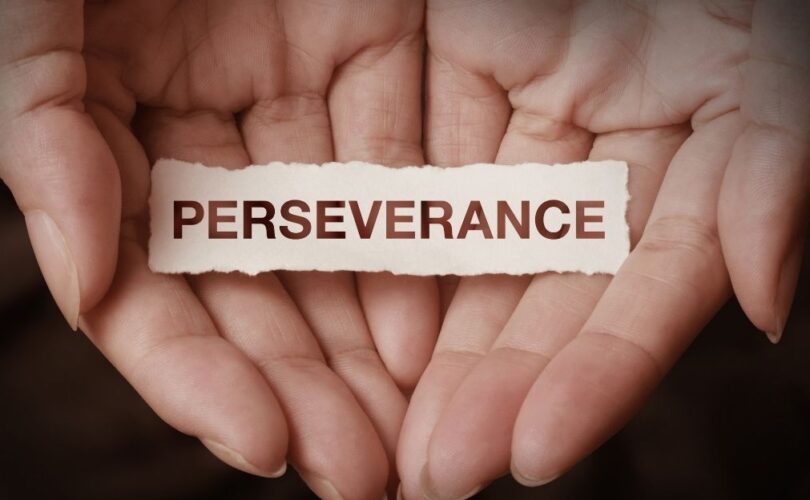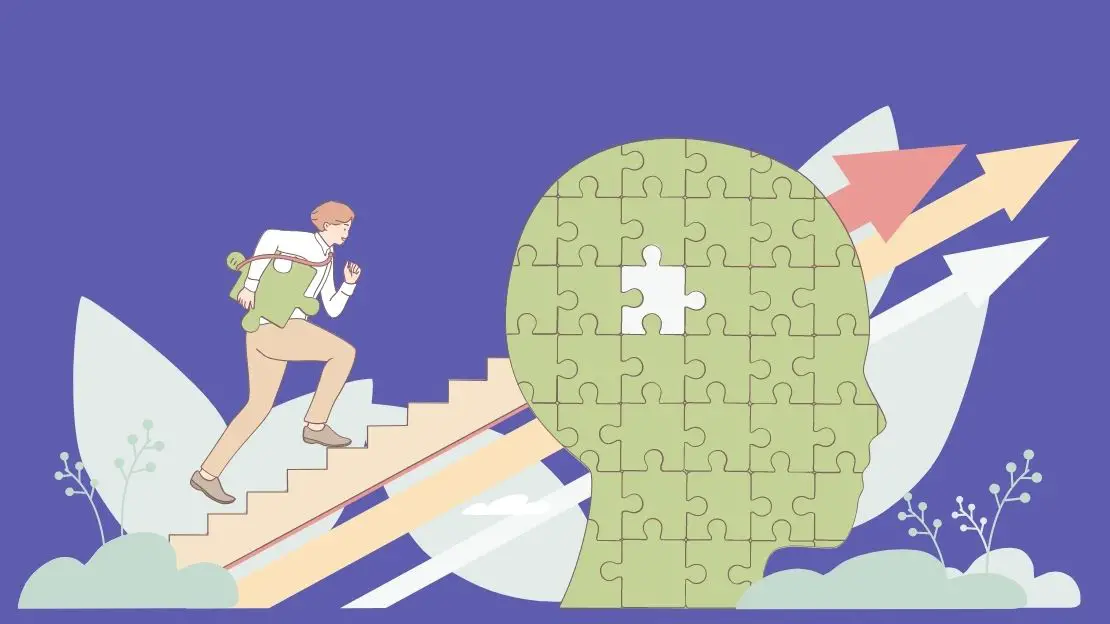Introduction To Perseverance
Perseverance can be defined as steadfastness in doing something despite difficulty or delay in achieving success. It is our ability to stay committed to a thing even amid hardships and even when the particular goal we are working towards is not quickly obtained (Shahid, 2018). Perseverance is also tightly linked to grit, a term coined by researcher and psychologist Angela Duckworth, defined as passion and perseverance for long-term and meaningful goals (Baruch-Feldman, 2017).
Perseverance is a type of personality trait that can be cultivated. Personality is a function of both temperament (genetics) and character (environment, experience, and education). Perseverance falls largely into the second category of character, whereby a person’s environment, experience, and education can shape them to persevere more or less. This means that at any time a person who cannot persevere can acquire, build, and improve upon the skill to develop its full potential (Constantin, 2020).
To persevere, you must first make an intentional choice. Before you move forward with the decision to do something difficult, you are given the chance to quit and give up. You get to choose whether you will face the hardship or run from it. This intentional choice can then establish the foundation for perseverance to be built because true perseverance is a habit.
It is a continual choice to keep trying amid difficulty, even when you know success is far off. It is the capacity to continue working towards a goal no matter what arises until the end and doing this continuously until this simply becomes a pattern of being or behavior (Constantin, 2020).
Benefits of Perseverance
When we commit to a task in the face of adversity, we can reap numerous benefits. It adds value to our personal lives, professional lives, and the lives of those around us.
1| Patience
Perseverance is a commitment to something even in the face of difficulty or delay. When you know that success or desired outcome is not immediate and you choose to stay committed to that goal or process anyway, that fosters patience. Patience is about an ability to delay gratification and exercise self-control. Again, choosing to wait it out even when you are being presented with reasons why you should quit strengthens the muscle within us that helps us develop self-control and be able to hit a pause button in situations versus gratifying ourselves instantly (Orloff, 2012).
2| Improved Mental Health
There appears to be a link between an attitude of perseverance and improved mental health. A paper entitled “Relation Between Cognitive and Behavioral Strategies and Future Change in Common Mental Health Problems Across 18 Years” was published online in the Journal of Abnormal Psychology.
The paper discussed a longitudinal study collected from the same group of participants over an 18 years period between 1995-1996, 2004-2005, and 2012 to 2013. During each evaluation, study participants filled out scale-based questionnaires designed to rate their degree of goal persistence, self-mastery, and positive reappraisal.
Study results demonstrated that participants who had more goal persistence and higher degrees of positivity from the time of the initial assessment period also had decreased rates of depression, anxiety, and panic disorders across the entire 18-year time span of the study.
The lead author of the study, Nur Hani Zainal of Pennsylvania State University, noted: “Perseverance cultivates a sense of purposefulness that can decrease current levels of major depressive disorder, generalized anxiety disorder, and panic disorder,” (Bergland, 2019).
3| Resilience
Resilience can be defined as our ability to navigate and recover from the challenges and hardships we experience in life. It is our capacity to deal with and overcome stressful and difficult experiences versus allowing stressful and difficult experiences to overcome us. Numerous aspects contribute to the development of a resilient mindset, with one of the most significant being positive thinking.
The paper “Relation Between Cognitive and Behavioral Strategies and Future Change in Common Mental Health Problems Across 18 Years” published online in the Journal of Abnormal Psychology also explored this link between perseverance and resilience. In addition to the results outlined above, the study also revealed that perseverance cultivated a sense of purposefulness that resulted in resilience.
Via perseverance, individuals were able to implement an explanatory style called positive reframing to find silver-linings in potentially dire situations that helped them pivot and bounce back from hardships over the course of the 18-year study period (Bergland, 2019).
4| Focus
When you make a firm decision to stick with something amid hardship it enhances the level of focus you have on that particular goal. The goal becomes the forefront of your focus as a means of keeping you committed and connected so that you continue to press through in the face of whatever difficulties you might experience (Colan, 2015).
5| Competence
The level of competence also increases as a result of perseverance. This is because a commitment to something for a prolonged period of time often means a prolonged period of learning and growth; it is through periods of trial and hardship that we learn skills, information, and tolls that help us become more competent and ultimately more successful in the long-term (Colan, 2015).
A 2014 research study found that graduate students who implemented a number of persistent strategies were able to prevail under institutional conditions that led other students to fail or drop out. These students did not only prevail beyond other students who did not last within the academic program, but they also academically outperformed other students who did stay in the program (Madhlangobe, L., Chikasha, J., Mafa, O., & Kurasha, P. , 2014).
This demonstrated a greater level of competence in academic subjects and greater mastery of skills being linked to greater levels of perseverance.
6| Confidence
There is nothing quite as confidence-building as facing a challenge and overcoming that challenge. When we are faced with adversity and making the decision to push through the difficulty and work to overcome it, we demonstrate to ourselves that we are in fact capable and competent. It is this demonstrative act that helps us build belief in ourselves and our abilities in a way that then builds resilience as we encounter future obstacles (Colan, 2015).
7| Adaptability
Adaptability is how well we can adjust to circumstances that arise. Most adversity we face is not expected, and most of the time when we must persevere, we were not expecting the challenge that appeared to arise. This means we learn how to cope with unforeseen circumstances and think on our feet. These scenarios better prepare us to respond quickly and constructively to other situations we may face in the future.
The Link Between Motivation And Perseverance
There is a link between our level of motivation and our ability to persevere in the midst of difficulty or delayed success. Motivation is the process that initiates, guides, and maintains goal-oriented behaviors. Motivation includes the biological, emotional, social, and cognitive forces that activate behavior.
The word “motivation” is frequently used to describe why a person does something. It is the driving force behind human actions. There are both intrinsic motivation factors and extrinsic motivation factors Intrinsic motivations speak to those that arise from within (i.e. personal gratification), while extrinsic motivations speak to those that come from outside a person and often involve rewards (i.e. awards, recognition, etc.) (Cherry, 2020).
There are three primary components of motivation: activation, intensity, and perseverance. Activation is the decision to initiate a behavior. Intensity is the concentration and vigor that goes into the pursuit of a goal. Perseverance is the continued effort toward a goal even though obstacles may exist (Cherry, 2020).
Based on this definition, it is clear that motivation cannot exist without perseverance. Similarly, it is reasonable to conclude that an absence of motivation would equate to an inability to persevere.
The Connection Between Our Beliefs And Our Motivation
The beliefs we hold can and will impact our overall motivation, which in turn will influence our ability to persevere. This can either be for the good or the bad.
One way that beliefs influence motivation is by impacting our perception. Self-efficacy beliefs relate to our perception of how good we are at a specific task. If we believe we are good at something, it is easier for us to maintain motivation, versus something we believe we are bad at.
Similarly, if we hold the belief that we are bad at something, we’ll lose motivation for it. Thus, the beliefs we hold shape the way we see ourselves and our abilities which in turn impact whether we feel driven enough to stay committed to a particular task or activity (Sanger Learning Center, 2020).
Beliefs can also significantly impact goals, which then influences motivation. Going back to self-efficacy beliefs, if you hold the belief that you are good at something or that you are capable of doing something, you are more likely to set goals for yourself that motivate you to continue towards tasks that align with those you feel you are able to accomplish. In the same way. If you feel incapable or incompetent, you either won’t set goals or the goals you set will be low and uninspired creating no motivation at all (Sanger Learning Center, 2020).
Another important way beliefs impact our motivation is by shaping our behavior. If we hold positive beliefs about our competence and abilities, then we are far more likely to engage in behaviors and activities that support those positive beliefs in ourselves.
And as a result, we continue to be motivated to pursue positive and challenging things. For instance, a belief that you are deserving of a promotion and capable of performing at that level will lead you to seek out the promotion and perform in ways at your job that are more likely to get you noticed and acknowledged for that promotion.
You’re also more likely to perform well in an interview for that role. It is the belief in self that motivates the actions of pursuing the promotion and performing well in the interview. Research suggests that beliefs about basic character- who you are as a person on a fundamental level- have the most significant impact on motivation levels (Breines, 2015).
Beliefs that Strengthen Motivation
There are a variety of belief systems and ideas that can work to strengthen and enhance our motivation.
1| Growth Mindset
Stanford psychologist Carol Dweck defines a growth mindset as the belief that one has the ability to learn and grow. Dweck writes in her book, Mindset: The New Psychology of Success, “This growth mindset is based on the belief that your basic qualities are things you can cultivate through your efforts… [that] everyone can change and grow through application and experience.”
Those who possess a growth mindset essentially believe that through hard work, good strategies, and input from others, their talents can be developed (Dweck, 2008). This mindset can improve motivation because it strengthens one’s belief in self.
When you believe in your ability to learn more or build upon your abilities, there are in a sense, no limitations. Therefore, you are motivated to try new things, venture into new territories, take risks, and explore opportunities because you aren’t afraid to fail (Pollock, 2020).
2| Optimism
Optimism is generally defined as the mental attitude in which an individual views life from a positive perspective. Optimists tend to be more self-confident and have higher levels of self-efficacy in their ability to perform in a good manner and achieve predefined goals. Optimism is linked to reduced stress levels and increased coping abilities of individuals in adverse situations.
One of the reasons this is observed is because of the link between optimism and intrinsic motivation (motivation that arises from within oneself). Optimism is a general disposition to expect positive outcomes rather than negative outcomes.
It is a control belief that is characterized by a statement or idea such as “good things can and will happen to me.” Because optimists see adversity as a challenge and have the ability to create opportunities and find ways out from problems, they are able to create motivation internally to push them forward when faced with challenges.
Optimism is the driving force for this intrinsic motivation, which acts as an underlying current that drives perseverance (Chaturvedi & Tripathi, 2014).
3| Enabling
Enabling beliefs are those that center around the idea that one’s actions influence outcomes. This belief essentially suggests that a person has the ability to control what happens in their own life or to influence what happens in their own life.
This matters because it eliminates helplessness and gives people a greater sense of control over their lives. When you feel like you have control over what happens in your life it motivates you and empowers you (Sanger Learning Center, 2020). You are therefore more engaged and more inclined to take action as a result.
Beliefs That Weaken Motivation
Just as there are ways of believing that can strengthen our motivation, there are also beliefs that can work against us and weaken our motivation.
1| Fixed Mindset
A staple of the fixed mindset is the notion that learning ability is fixed and cannot be changed. Essentially, it is the idea that once one has reached a particular level of knowledge or skill, that is the level they shall continually remain at.
This type of mindset weakens motivation because when you fail or make a mistake you attach meaning about yourself to that failure or mistake. It prevents you from putting any effort or energy into a cause or towards a goal because you fundamentally believe your abilities cannot be built upon (Pollock, 2020).
2| Pessimism
Pessimism can be defined as a tendency to see the worst aspects of things and expect the worst to happen in a situation or circumstance. It is a lack of hope or confidence in the future, a situation, or an individual (including self).
Research has shown that a persistently pessimistic attitude can lead to decreased motivation. This is because a pessimistic attitude causes individuals to have/set low expectations which lead to a decreased desire, drive, and performance (Norem & Cantor, 1986).
3| Self-Sabotaging
Self-sabotaging beliefs are those that involve the idea that an individual’s efforts will be fruitless. It’s the belief that there is no point in giving something any effort because it will not result in a positive outcome.
This attitude is essentially hopelessness that drains motivation and prevents a person from desiring to attempt or try anything because of the preconceived notion that it is already doomed to fail (Sanger Learning Center, 2020).
Other Ways To Cultivate Perseverance
In addition to having a strong belief system, there are additional ways to cultivate perseverance in your life. The following outlines some additional ways the characteristic of perseverance can be
Have a Vision
Having a larger vision to work towards helps you better commit and persevere in the face of challenges. When you have a larger vision that you are connected to, it reminds you of the ‘why’ behind your work. It will serve as the reminder when the going gets tough as to why you are in this and why you shouldn’t give up (Muguku, 2018).
Clearly Define Your Goals
It is hard to stay committed to something that is not well defined. You need to know what you are working towards in order to connect with it and stick with it amidst adversity. Having goals within your larger vision gives you structure, targets, and benchmarks that make your larger vision seem more achievable and attainable. Goals set should be SMART- specific, measurable, achievable, realistic, and timely so that they can actually help guide the process (Muguku, 2018).
Have a Support Network
The support of others can be a valuable asset when it comes to the development of perseverance. Face it, there are very few things we can truly do all by ourselves. We all need others in some form or fashion to assist us and we shouldn’t feel ashamed because of that.
The help we receive from others can actually take some of the burden off of us and make it so that we can continue to press on in the midst of hard times. Whereas trying to tackle a struggle on our own might mean failure or quitting prematurely (Muguku, 2018).
Reframing
Reframing is a process that involves altering the way we view a current situation/circumstance so that we see it differently. Positive reframing involves looking at situations and circumstances typically deemed negative or challenging and intentionally choosing to seek out the positives of those situations and circumstances. It’s about consciously and intentionally shifting perspectives to adopt a positive one (Kuo, 2017).
The challenge-hindrance stressor framework researched by Cavenaugh and colleagues in 2000 found that individuals who reframed problems and viewed them with curiosity were more likely to solve those problems and move forward, as opposed to being defeated by the issue (Pennock, 2014).
This promoted perseverance because the more positive perspective (the challenge perspective) that was intentionally fostered led people to see challenges as opportunities for growth and improvement. This meant people faced and rose in the face of challenges, thus persevering and ultimately becoming more resilient as well.
Gratitude
Research suggests that people who spend a few minutes per day focusing on gratitude begin to develop a brain pattern of automatically scanning for positives versus negatives after approximately three weeks.
The practice of gratitude fosters perseverance by changing our brains to automatically see challenges through a positive lens which then allows us to embrace hardships and grow from them (Pennock, 2014). We are then able to choose to press forward amidst hardships because we see the positives more than the negatives.
What is clear is that motivation is a complex and layered process that can be impacted by a variety of elements namely activation, intensity, and perseverance. The varying levels of each of these elements impact motivation, and with regards to perseverance alone there are a host of factors that can influence just that one element. Among one of the strongest of those influences is our belief or belief systems.
A fixed-mindset, pessimism, or self-sabotaging beliefs can foster feelings of hopelessness and a sense that there is no use in putting forth effort because one’s situation or level of knowledge cannot improve. Thus, there becomes no motivation to try, move forward, or improve.
On the other hand, a growth-mindset, optimism, or enabling beliefs can foster feelings of hope and positivity as they generate a sense that one’s situation can and will improve, and that one’s intellect and skills can be built upon. Thus, there becomes an intrinsic motivation to persist past challenges and hardships until success is achieved even if that success is not quickly achieved.
Beliefs can serve as a strong foundation for motivation and work in conjunction with other methods as a means of cultivating an attitude of perseverance. And via continued practice and implementation, both motivation and perseverance can grow stronger until they become second nature.
Therefore, each of us should strive to make a regular habit of cultivating positive beliefs so that our motivation is enhanced and our perseverance increases naturally. It’s a skill that will serve us and those around us well, and we’ll reap great benefits as a result.
References
Breines, J. (2015, August 30). 3 ways your beliefs can shape your reality. Psychology Today.
Chaturvedi, K. D., & Tripathi, A. (2014, December).
Cherry, K. (2020). The psychology of what motivates us. Verywell Mind.
Colan, L. (2015, March 4). 10 things the most persevering people do. Inc.com.
Dweck, C. S. (2008). Mindset: The new psychology of success. House Digital, Inc. Chicago
Muguku, D. (2018, November 4). 9 tips on how to persevere in order to succeed. ThriveYard.
Orloff, J. (2012, September 18). The power of patience. Psychology Today.
Pennock, S. (2014, December 30). Resilience in positive psychology: Bouncing back & staying strong.
Sanger Learning Center. (2020).
Shahid, M. (2018, November 5). Perseverance is a major key to a life of success. Addicted 2 Success.







